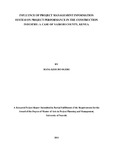| dc.description.abstract | Construction projects are commonly acknowledged as successful when they are completed on time, within budget, and in accordance with specifications and to stakeholders’ satisfaction. Many of the projects exceed the original cost; get cancelled prior to completion, while others fail on terms of the delivered functionality. While large amounts of time and resources are dedicated to selecting and designing projects, it remains of paramount importance that projects be adequately managed in organizations if they are to achieve their performance objectives. The purpose of the study was to establish the influence of Project Management Information System on project performance in the construction industry; a case of Nairobi County, Kenya. The Objectives of this study were to determine the influence of: the system, quality information, the system user and the system use on performance of construction projects. Descriptive survey was used this enabled the researcher obtain the opinions of project managers in their natural setting and it is also good for management decision making. The target population of the study was 98 from which a sample size of 80 was determined from the Krejice and Morgan table (1970), purposive sampling was used to select the sample from the target population. After data collection, the questionnaires were cleaned, coded and organized out which 76% of the self-administered questionnaires were analyzed. Validity of the research instrument was ascertained by seeking the opinions of experts in the field of study; 10% of target population was selected to test the reliability of the research instruments. Cronbach’s alpha test was utilized in assessing reliability of research instrument an alpha value of 0.9584 was obtained, thus the research instrument used was reliable. the research instrument used was reliable.the research instrument used was reliable.the research instrument used was reliable. the research instrument used was reliable.the research instrument used was reliable. the research instrument used was reliable. the research instrument used was reliable. the research instrument used was reliable. the research instrument used was reliable. the research instrument used was reliable. the research instrument used was reliable. the research instrument used was reliable.the research instrument used was reliable.the research instrument used was reliable. the research instrument used was reliable. the research instrument used was reliable. the research instrument used was reliable.the research instrument used was reliable. Descriptive statistics and Correlation (using the Karl Pearson’s coefficient of correlation) was used to analyse the data and establish the relationship between the dependent variables and the set of independent variables using the SPSS version 20 software. The four independent variables (the system, quality of information, the system user and the system use) were found to have a strong and positive correlation with the dependent variable (project performance). The research also found out that the use of the system to generate quality information needed by the user (project manager) to perform project tasks helped the project managers perform their tasks in a more professional manner thus increasing the performance of the project. It was therefore concluded that the use of Project Management Information System helped in the improving performance of project while respecting the projects constraints of time, budget and quality specification while meeting the project objectives. Future studies could evaluate performance from the client’s perspective, that is, evaluate if the impacts of the Project Management Information System on project outcomes provide an adequate solution to the client’s problem, bring true advantages to the organization in terms of quality of product/services offered, greater output volume, quicker delivery, and better strategic positioning, and provide tangible benefits such as increased sales and revenues | |

